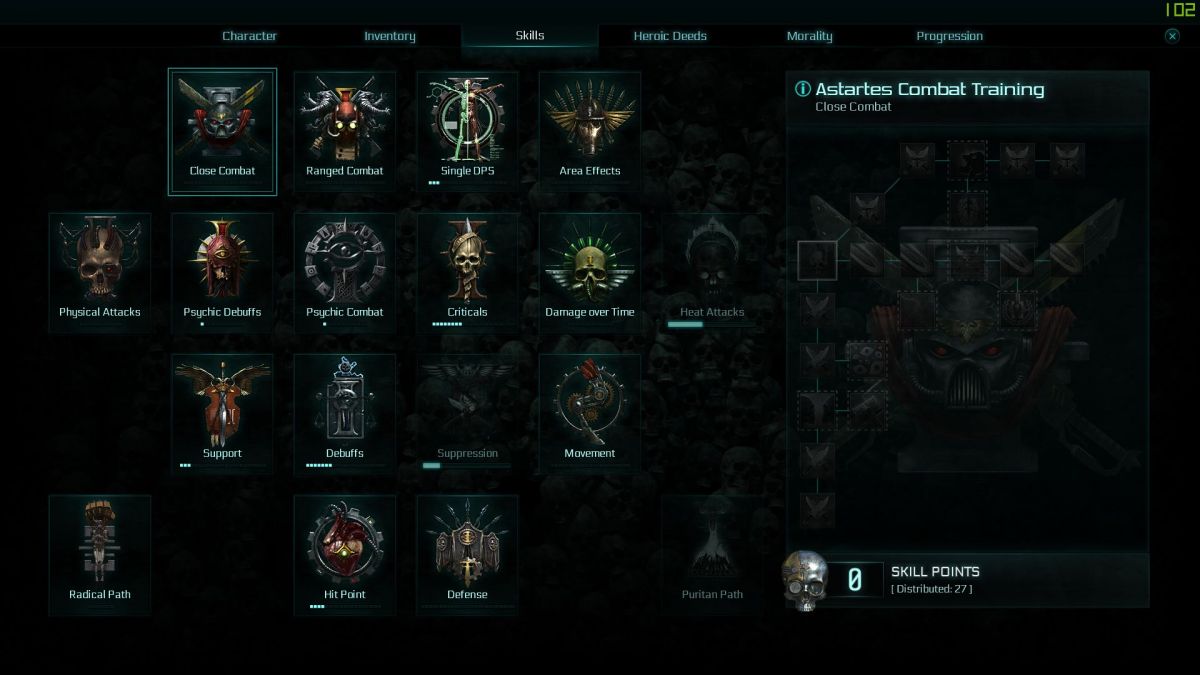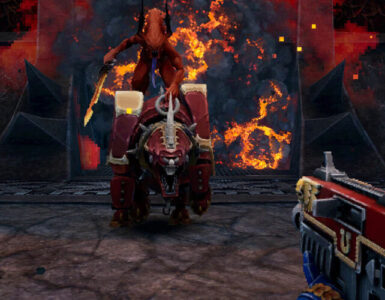With no shortage of Warhammer games in the market, gamers can be assured that there’s a Warhammer title matching any gaming preference. Be it real-time strategy to endless horde mode, gamers have pretty much seen it all, except for an action RPG, until now.
Some might argue that Dawn of War III comes close, but ultimately it was more of a real-time strategy game, with DOTA elements sprinkled throughout. With Warhammer 40K: Inquisitor – Martyr, we are seeing the closest at a Diablo-esque title, which features plenty of big damage numbers and loot, as players grind towards the level cap.
There’s definitely more to an action RPG that just the above two features. Even with Diablo III, which was crafted by the original inventor of the genre. Blizzard, the game had a tricky time nailing down the mechanics for modern gamers, and it took Blizzard an expansion plus a few years more, to get it right. Looking at the design decisions made by developers Neocore on Inquisitor – Martyr, one can see that they have been taking notes.
Set aboard the “Martyr” battleship, the game has your inquisition zipping around the universe, battling threats as you slowly unravel the mystery behind the Martyr itself. The foes that you’ll be facing off against are limited to the forces of Chaos and Imperial Guard, which is kind of limiting considering the rich tapestry of factions found in the game’s universe.
Starting out in Inquisitor – Martyr is a pretty standard action RPG fare, you pick from three classes depending on your play style. At the class selection menu, you’re presented with a Space Marine Crusader, Death Cult Assassin, and Psyker. While these might give players the impression of the classes of falling into the archetypes of melee, ranged, and magical characters, we’re only scratching the surface of what Inquisitor – Martyr has to offer.
Given that the Warhammer 40K universe has Space Marines laying down suppressing fire with a Heavy Bolter to getting up close with a Thunder Hammer, it’s only natural for Inquisitor – Martyr to explore this opportunity.
With so many weapons to choose from, Neocore decided the best way to ease players into each new weapon would be the unlock them as a player ranks up in game. It’s an arduous process to unlock them all, and players will have to hit midgame to access everything in the arsenal.
Picking a specific weapon means gaining access to specific skills for each class. But their purpose typically falls into either strong crowd control or single target damage, thus making all weapons eventually feel pretty much the same. Tactically, it would be a challenge for players to become a jack of all trades, given the limited amount of skill points made available.
Featuring seventeen talent trees to deck out, players are encouraged to explore which form of combat suits them most. Be it close combat, long range, area of effect attacks, everything can pretty much be customised. If you’re the type that loves turning up the heat and burning everything in your path with a flamer, the area of effect tree is out there for you to invest some skill points in. While the number of skill trees looks staggering, there’s quite a bit of bloat which is unnecessary. Most players will see themselves investing in 2-3 trees by the end of the campaign, which takes about 10 hours to complete. It feels as though much of the game has been padded by the developers in an attempt to mask what little depth the title has to offer, if not for the popular IP in which the entire game hinges on.
If you’re a veteran action RPG player looking for a new itch to scratch, the best way to experience Inquisitor – Martyr is to start off with the Assassin or Psyker class right from the offset. Having played through once with the Crusader before delving into the other classes is as clear as night and day. The Assassin and Psyker reward good skill management to deal with enemies, while the Crusader is closer to a single button wonder who has trouble dealing with evolving enemy types. While it would be unfair to judge based on the weakness of one class, the experience with the Crusader class is a stark contrast with the others and feels underdeveloped.
While we can easily look past the flaws of Inquisitor – Martyr, given that many can be addressed given time and experience, the key concern with the game is its levelling curve, and how the developers have chosen to tune the difficulty. While it’s not uncommon in similar titles for players to grind out the correct item drops needed for success, Inquisitor – Martyr tailors each mission’s difficulty based on your character’s item level.
This forces players to potentially change out their loadout regularly, to ensure they stay ahead of the power curve, regardless if it makes sense to your skill build or not. Naturally, classes like the Assassin and Crusader and mostly affected due to their reliance on strong weapons, while the Psyker gets a bit more leeway. Compound this with skills trees that can only be reset with a random item drop or purchased through the in-game vendor, goes on the emphasize the odd design choices made by the developers.
With so many weapons given to players adding a nice level of mechanical depth, the story for Inquisitor – Martyr couldn’t be more shallow. For the most part, the tileset of the game eventually loops quite a fair bit, and the amount of load screen transitions going from hub to actual level grinds at you.
In the absence of story, blowing up and bringing down destruction on the heretic, mutant, and unclean is done amazingly well. While developers could easily have enemies blow up in the same way regardless of the weapon used, it’s strangely satisfying to see how they meet their demise at the end of a Plasma Cannon or burnt to a crisp with some wrap powers. Come for the visuals, and ignore the story is the best way to enjoy this title.
All things considered, Inquisitor – Martyr has nailed down all the core elements which make action RPGs so compelling. Since it’s release, Neocore has been plugging away at quality-of-life improvements. Frame rates stay consistent during periods of heavy action, and the team has created seasonal events to keep the community going.
But the biggest bugbear that remains? Warhammer 40K Inquisitor – Martyr is an online-only title, so if the servers are down, there goes your playtime as well. Whether or not this actually helps with piracy or cheating is debatable but the possibility of not playing this game offline in years to come is highly likely.
Warhammer 40k: Inquisitor – Martyr was reviewed on the PC. Console editions will be released soon.
GEEK REVIEW SCORE
Summary
Finally, a Warhammer 40K title that scratches the action rpg itch. However, it’s not the best in the genre but if given time (and patches) Inquisitor Martyr could etch itself as one of the must plays in the Warhammer universe.
Overall
7.1/10-
Gameplay - 8/10
8/10
-
Story - 6/10
6/10
-
Presentation - 7.5/10
7.5/10
-
Value - 7/10
7/10
User Review
( votes)Gerald currently straddles between his love of video games and board gaming. There’s nothing that interests him more than trying out the newest and fanciest gadget in town as well. He dreams of publishing a board game sometime in the future!













